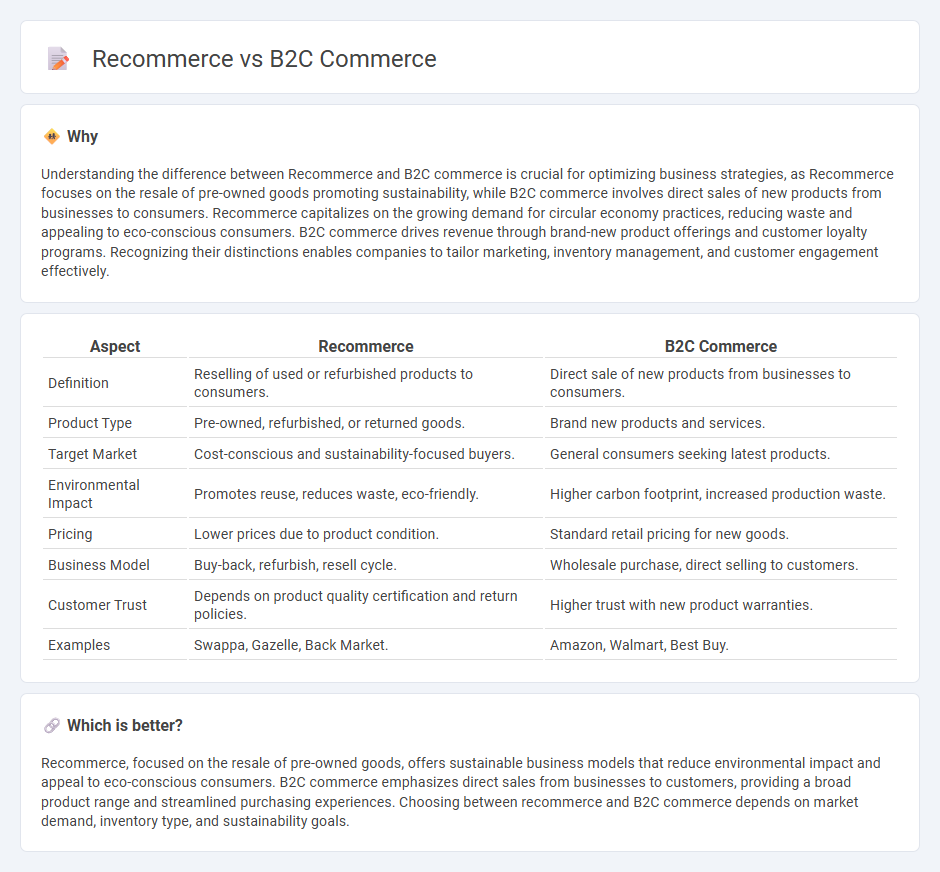
Recommerce involves the resale of pre-owned goods through online platforms, emphasizing sustainability and cost savings by extending product lifecycles. B2C commerce focuses on direct sales from businesses to consumers, typically featuring new products and streamlined purchasing experiences. Explore the differences and benefits of recommerce and B2C commerce to optimize your retail strategy.
Why it is important
Understanding the difference between Recommerce and B2C commerce is crucial for optimizing business strategies, as Recommerce focuses on the resale of pre-owned goods promoting sustainability, while B2C commerce involves direct sales of new products from businesses to consumers. Recommerce capitalizes on the growing demand for circular economy practices, reducing waste and appealing to eco-conscious consumers. B2C commerce drives revenue through brand-new product offerings and customer loyalty programs. Recognizing their distinctions enables companies to tailor marketing, inventory management, and customer engagement effectively.
Comparison Table
| Aspect | Recommerce | B2C Commerce |
|---|---|---|
| Definition | Reselling of used or refurbished products to consumers. | Direct sale of new products from businesses to consumers. |
| Product Type | Pre-owned, refurbished, or returned goods. | Brand new products and services. |
| Target Market | Cost-conscious and sustainability-focused buyers. | General consumers seeking latest products. |
| Environmental Impact | Promotes reuse, reduces waste, eco-friendly. | Higher carbon footprint, increased production waste. |
| Pricing | Lower prices due to product condition. | Standard retail pricing for new goods. |
| Business Model | Buy-back, refurbish, resell cycle. | Wholesale purchase, direct selling to customers. |
| Customer Trust | Depends on product quality certification and return policies. | Higher trust with new product warranties. |
| Examples | Swappa, Gazelle, Back Market. | Amazon, Walmart, Best Buy. |
Which is better?
Recommerce, focused on the resale of pre-owned goods, offers sustainable business models that reduce environmental impact and appeal to eco-conscious consumers. B2C commerce emphasizes direct sales from businesses to customers, providing a broad product range and streamlined purchasing experiences. Choosing between recommerce and B2C commerce depends on market demand, inventory type, and sustainability goals.
Connection
Recommerce, the business of reselling pre-owned goods, directly influences B2C commerce by expanding the product lifecycle and offering sustainable shopping options to consumers. This connection enhances B2C platforms through increased inventory diversity and appeals to environmentally conscious buyers seeking affordable alternatives. Leveraging recommerce within B2C frameworks drives customer engagement and supports circular economy principles.
Key Terms
Direct Sales (B2C)
B2C commerce involves direct sales from businesses to consumers through online platforms or physical stores, emphasizing new product offerings and brand experience. Recommerce focuses on the resale of pre-owned goods, leveraging sustainable practices and cost-effective options to attract eco-conscious shoppers. Explore detailed insights to understand how these models shape consumer trends and business strategies.
Consumer-to-Business (Recommerce)
Recommerce, a Consumer-to-Business (C2B) model, enables consumers to sell pre-owned products back to businesses for refurbishment or resale, contrasting with B2C commerce, where businesses sell new products directly to consumers. Key benefits of recommerce include sustainability, extended product life cycles, and cost savings, driving consumer demand for eco-friendly purchasing options. Explore how recommerce is transforming retail and creating new opportunities in circular economy markets.
Product Lifecycle
B2C commerce emphasizes selling new products directly to consumers, driving initial demand and maximizing product launch impact while often neglecting post-sale phases. Recommerce extends the product lifecycle by facilitating the resale, refurbishment, or recycling of used goods, promoting sustainability and resource efficiency in consumer markets. Explore how integrating recommerce strategies can enhance your business's environmental footprint and customer engagement.
Source and External Links
What is B2C? | Definition from TechTarget - B2C (business-to-consumer) is a retail model where products or services are sold directly from a business to end users for personal use, often via online platforms like Amazon or Uber.
B2C Commerce - Salesforce Developers - Salesforce B2C Commerce is a cloud-based ecommerce platform that lets businesses build, customize, and manage online stores with tools for integration, scalability, and security.
The Basics of B2C Ecommerce - Zoho - B2C ecommerce enables businesses to sell directly to consumers online, expanding their reach globally and offering convenience compared to traditional brick-and-mortar stores.
 dowidth.com
dowidth.com